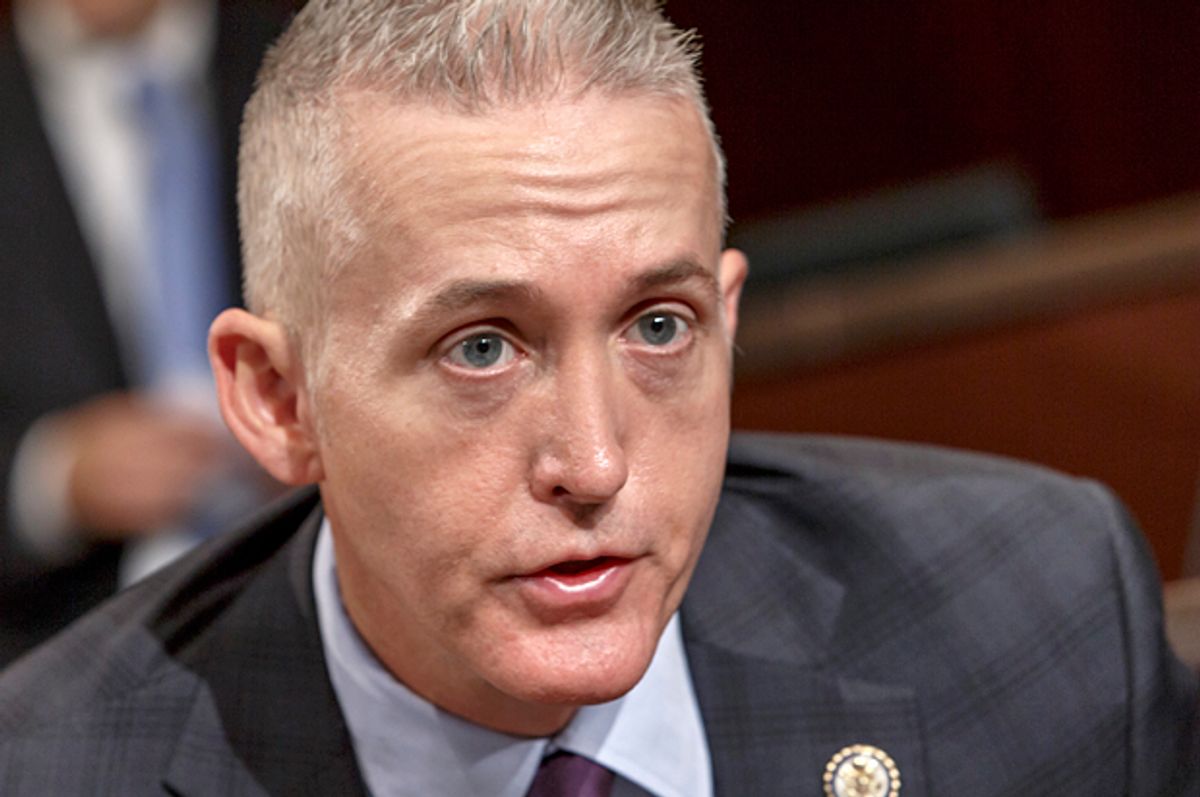The chaos and dysfunction currently roiling the Republican majority in the House of Representatives has made life difficult for the House Select Committee on Benghazi. Under the leadership of Trey Gowdy, the committee had been maintaining a low profile, keeping quiet and staying out of the news as it dug up dirt on Hillary Clinton to strategically leak to the press. The low-profile game plan was shot to hell by Kevin McCarthy, who bragged of the committee’s political agenda on national television, and was then forced to walk back his comments and deny saying the thing he said several times over. Suddenly, Gowdy and his committee were facing the one thing they’d hoped to avoid: scrutiny.
That scrutiny has taken the form of a front-page New York Times investigation into what the committee has been up to over the past year and half. What the paper turned up is an investigation that didn’t really seem to be going anywhere until Hillary Clinton’s emails emerged as an issue, at which point its focus “shifted” from the actual attacks in Benghazi to Clinton’s electronic communications. And, in keeping with the general disarray of the House Republican caucus, the Republicans on the Benghazi committee are offering confused and contradictory explanations for what is going on with the investigation.
As the Times notes, the official response from the Republicans on the committee is to “dispute any suggestion that their inquiry… has been partisan or ineffective or that it has changed course.” That has been the consistent refrain from Republicans since the committee was established, though it became harder to maintain that fiction in the aftermath of McCarthy’s inopportune truth-telling. But the unofficial Republican response to the committee’s recent troubles is a bit more enlightening:
Senior Republican officials, who spoke on the condition of anonymity because they were discussing confidential conversations, said that Mr. Boehner had long been suspicious of the administration’s handling of the attacks and that Mrs. Clinton’s emails gave him a way to keep the issue alive and to cause political problems for her campaign. But he thought that the task was too delicate to entrust to others and that it should remain with Mr. Gowdy, the former prosecutor.
Boehner announces he’s stepping down as Speaker, McCarthy gives up the game on the committee’s real purpose, and now Republican officials are dishing to the Times about how it was all the outgoing Speaker’s idea to focus on Hillary’s emails for political benefit. This has all the hallmarks of a cover-your-ass operation – Paul Waldman sees this as Gowdy and his people working to push away any responsibility for what is turning into a damaging story for his committee. One can understand why the chairman would want to do that, given that Gowdy’s and the committee’s credibility are intertwined. His reputation as a serious, “prosecutorial” investigator was offered by the committee’s supporters as a defense against claims that the investigation would become a partisan fishing expedition.
But it doesn’t really matter what excuses Republicans come up with. The Times story has punched a hole in the committee’s credibility and made clear just how little trust one can place in the public statements emerging from the Benghazi investigators.
Way back in May, the House Select Committee on Benghazi released was is, to date, its only official publication: an interim progress report detailing what the committee had accomplished in the first year of its existence. Even by its own reckoning, the committee couldn’t point to much in the way of meaningful discoveries – a large portion of the report is devoted to complaints about delays in obtaining documents. But Gowdy and the Republican majority insisted that the investigation was proceeding apace and focused on “three broad questions” related to the Benghazi attacks: why we were there, what actions “relevant agencies” took during the attacks, and the White House’s response. They wrote that they were going to start conducting interviews with personnel outside the State Department. “The Committee takes its mandate seriously,” the report concluded.
We now know that none of that was true. The three-pronged investigation was supplanted by a singular focus on Clinton’s emails. The interviews they promised would happen were, per the Times, “never followed up on.” And its mandate seems to have been abandoned in a messy political fight that is threatening to blow up in their faces.


Shares